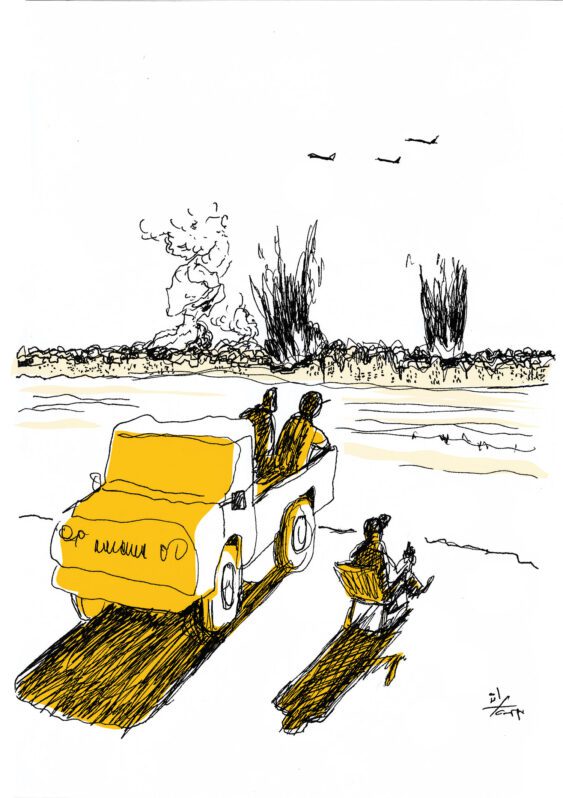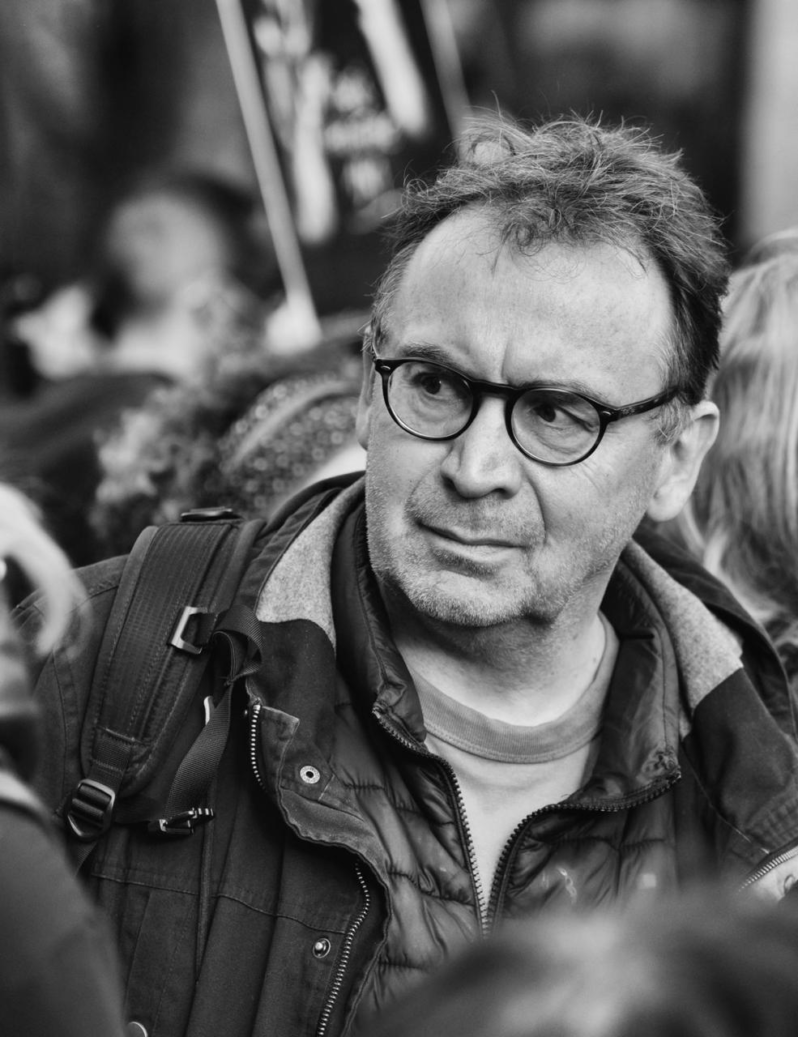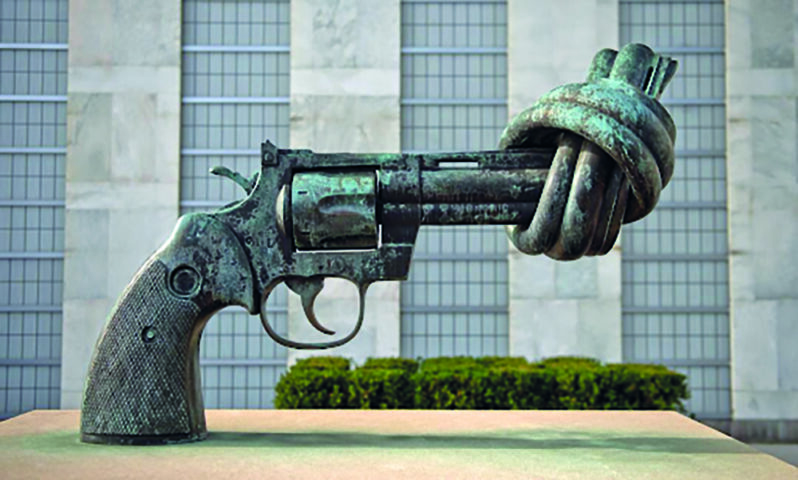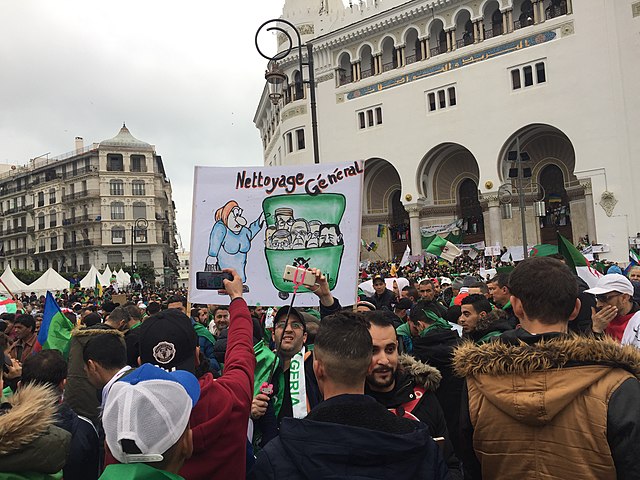Interpreting Kais Saied’s Measures in Light of His Political Vision
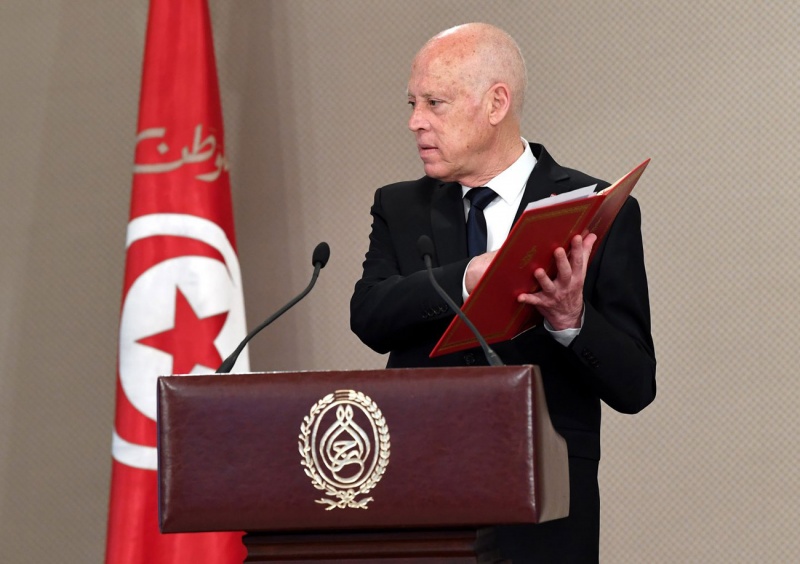
On 25 July 2021, in a speech delivered in a meeting with military and security force leaders, Tunisian President Kais Saied declared that under Article 80 of the Constitution, which provides for a “state of exception”, he was suspending Parliament, lifting immunity from all its members, and taking over as head of the Public Prosecution to pursue the cases against them. He added that he would take over the entire executive branch by handpicking a new government and that he had dismissed the prime minister and would summon a new one answerable to him.
In the speech, the president maintained that his decisions were constitutional and justified them on the basis of that day’s protests, some of which had been violent. He stressed that his goal was to tackle rampant corruption about which he could no longer remain silent. The decisions were met with popular applause first evident in the supportive demonstrations that took place in most Tunisian cities, some of which stormed and vandalized Ennahda Party offices. Some political elites explained this reaction on the basis of the governmental system’s responsibility for the socioeconomic deterioration and its failure to spur development. They also cited the rejoicing crowds’ faith in the honest president who had demonstrated on every occasion that he rejects the normalization of corruption. On the other side, Ennahda denounced what it described as a coup that completely violates the constitutional article that Saied invoked, and its spokespeople talked of a conspiracy targeting the democratic path. Ennahda President Rached Ghannouchi, in his capacity as Parliament speaker, called upon the party’s supporters and democratic forces to join him in a sit-in in front of the Parliament building, which the army had cordoned off.
Ghannouchi’s call did not garner the response he anticipated. Only a handful of MPs from his party, its close partner the Dignity Coalition, and its ally the Heart of Tunisia party, along with a few dozen Ennahda supporters, attended Kasbah Square. Ennahda’s apparent political isolation indicated that public discontent with its performance and discourse was the reason that it, along with its ally PM Hichem Mechichi, could so easily be removed. Its allies’ weak response to its call also validated the accusations of political opportunism and a lack of principles directed against them. The prevailing mood compelled most actors to accept the fait accompli and find justifications for Saied’s position while seeking guarantees from him that rights and freedoms would not be infringed and insisting that there should be no return to autocracy. The latter demand was in harmony with foreign pressure that revealed the attachment of some international parties to the Tunisian democratic experiment.
Amidst this interplay, the president’s talk of installing himself as head of the Public Prosecution and his pledge to tackle the “manipulation” of corruption cases in the courts was met with significant opposition within and beyond the judicial community because of the control it would afford him over the judiciary. Hence, he was forced to back down from this move by omitting it from the communique containing the decisions. Likewise, he received Supreme Judicial Council President Youssef Bouzakher and several council members and pledged to them to respect the judiciary’s independence and not interfere in its work.[1]
The occupational political forces, particularly the Tunisian General Labour Union’s leadership, also considered Saied’s measures a concern. This compelled him to include a 30-day time limit on the measures in his official communique, to pledge in his meeting with the occupational organizations that the measures would be lifted as soon as the exceptional circumstances warranting them disappear, and to make the same commitment during his discussion with US Secretary of State Antony Blinken.[2]
The above indicates that the measures of July 25 had apparent causes that are enough in and of themselves to explain the reaction they evoked from the populace and elites. It also shows that irrespective of their characterization, their outcomes will partially depend on the stances of actors inside Tunisia and abroad. While this picture is relatively accurate, it neglects some important background, including the role of Saied’s political platform in pushing forward these measures and in their potential outcomes.
Attempts by the regional axes opposing[3] and supporting[4] the Arab Spring to influence the recent developments in Tunisia[5] indicate that the former may have played a role in manufacturing them and the latter may be playing a role in containing them. However, from these indications, it is difficult to draw firm convictions about these roles or categorical facts that explain Saied’s decisions. On the other hand, Saied’s discourse and political thought, which have so far remained undiscussed, provide much insight into the background of these decisions.
Saied’s Presidential Platform
When Saied was a presidential candidate, he was asked about the apparent contradiction between his run for the presidency and the opposition he had expressed to the political system. He responded that he proposes a “reestablishment” based on “new political thought” interpreted by a constitution that “actually is new”. He pledged that, should he be elected, there would be no more parliamentary elections per the previous conception, i.e. in the framework of representative democracy.[6] However, he then affirmed that this change would occur via constitutional mechanisms. At that time, how he could instigate it was unclear given that he lacked a band of parliamentary support. His seizure of the executive branch and suspension of the legislature harks back to this pledge and suggests that it could be his means of achieving the renewal he desires. Saied’s vision is based on establishing an “elevatory” [tas’idiyy] democracy and terminating the role of parties in the context of a strong presidential system of government.
Multiple Statements that Representative Democracy is Not the Solution
In all his statements before he became president, Saied maintained that representative democracy is an obsolete system in crisis. He proposed an alternative political system consisting of the following:
- One local assembly per delegation in the country.[7] The members of these assemblies would be elected directly based on individual candidatures that must be accompanied by a recommendation, and voters could terminate their fixed terms at any time. These assemblies would examine local development projects and approve appointments proposed by the central authority for the positions of local administrative and security officials.
- Regional assemblies comprising one member of each local assembly chosen by lot. The regional assemblies would draft and implement the regional development plan, and regional administrative officials would participate in their deliberations without the right to vote.
- A national assembly to which each local council “elevates” one of its members via election. This council would draw up public policy and issue laws.
Accusing the Political Parties of “Usurping the Revolution”
In a media statement in 2014, Saied argued that none of the political parties or organizations led the Tunisian youth and people on 14 January 2011, that their platforms are “virtually the same” and had “taken us backward”, and that they are “totally disconnected” from reality and “incapable of leadership”. He attributed the parties’ usurpation of governance to the list-based electoral system, because of which elected figures owe their positions not to the will of the voters who elected them but to the central party authority that nominated them. He called for the adoption of local electorates and elections based on individual candidatures rather than lists, deeming it the voting method that could put an end to the “deviations”.[8] In 2013, Saied had explicitly called upon the political parties to withdraw from the public arena because their role had ended.[9]
Subsequently, after becoming president, several of Saied’s supporters who had promoted him during his electoral campaign thought that the next step would be to incorporate them into a political party. However, he disappointed them and insisted on denying any connection to the attempts to use his name in the creation of their party. He maintained his stance against joining any party and, furthermore, has insisted during his term on preventing the parties from taking center stage. For example, when it fell on Saied to choose a new prime minister after his initial choice resigned, he neither held direct consultations with the parties to discuss their candidates nor asked them for lists of nominations. Rather, he selected Mechichi, whom no parliamentary party had nominated and was not known to have any political vision. Moreover, during the crisis arising from Saied’s [recent] decisions, he did not receive or speak with party representatives, instead opting to engage with representatives of professional and civil society organizations.
Commitment to a Presidential System
When the National Constituent Assembly’s constituent committees were conceptualizing the political system that would be adopted by the Second Republic’s Constitution, the relevant committee interviewed Saied. He presented a presidential system inspired by the 1976 amendment to the 1959 Constitution. He called upon the members to adopt an executive branch unified under the command of the president and to stipulate that his prime minister be the one to supervise governmental work and the government be subject to parliamentary oversight and accountability, which could go as far as issuing a motion to censure it. In such cases, the president would assign a new government, and should the government face another motion to censure, he and his government would be compelled to resign.[10]
Saied has not backed down from his advocacy of this system as he presented it in mid-June 2021 as a condition for participating in the search for a way out of the political crisis to which Tunisia had deteriorated.[11]
Conclusion
It is still too early to comprehend all Saied’s reasons for taking the July 25 measures. However, doing so will require also understanding his political ideas, which totally contradict the existing political system and threaten to prevent the constitutional institutions from returning to operation in accordance with the Constitution and the essence of the democratic process. Let’s keep watching.
The article is an edited translation from Arabic.
[1] The communique issued by the President’s Office on 26 July 2021 stated,
“On the evening of Monday, 26 July 2021 in the Carthage Palace, President Kais Saied received Supreme Judicial Council President Mr. Youssef Bouzakher, Supreme Judicial Council Member and Judicial Judiciary Council President Ms. Malika al-Mazari, and Supreme Judicial Council Member and Vice-President of the Administrative Judiciary Council Mr. Abd al-Karim Rajih. The state president affirmed his commitment to respecting the Constitution and its requirements, enforcing the law on everyone, and ensuring the independence of the judiciary in this delicate stage of Tunisia’s history”.
The communique issued by the Supreme Judicial Council on the same date stated,
“During the meeting, it was emphasized that the judicial branch is independent and must be distanced from all political quarrels; that judges are independent, not under any authority when judging except that of the law, and undertake their functions in the framework of the Constitution and law in protection of rights and freedoms; and that the Public Prosecution is part of the judicial judiciary whose personnel enjoy the same rights and guarantees afforded to the sitting judiciary and perform their functions within the framework of the legal texts in force”.
[2] In an interview with Al Jazeera broadcast on 29 July 2021, the US secretary of state revealed that in a phone call on July 26, Saied had pledged to restore the operation of the institutions as soon as possible. He added that the US is not satisfied with statements and is awaiting actions.
[3] Qatar and Turkey in particular.
[4] The UAE and Egypt in particular.
[5] For example, these powers have used their media outlets to rally support for the side they back.
[6] “al-Shari’ Tunshiru Hiwar Qays Sa’id Kamilan”, Acharaa, 12 June 2019.
[7] “Delegations” are the local administrative divisions in Tunisia.
[8] “al-Ustadh Qays Sa’id: al-Siyasiyyun Yuriduna al-Ta’amul ma’a al-Shabab ka-l-Qati’, Yakhtaruna lahu Kayfa Yakhtaru wa-Yakhtaruna lahu Man Sayakhtaru”, Jomhouria, 9 July 2014.
[9] “Qays Sa’id li-l-Sabah al-News: Intaha Dawr al-Ahzab wa-‘ala al-Sha’b an Ya’khuda bi-Zimam al-Umur bi-Hadhihi al-Tariqa”, Min Ajl Ta’sis Jadid: al-Ustadh Qays Sa’id, 2 September 2013.
[10] For Saied’s opinion, see his interview with Shems FM, “Ahsan Nizam Siyasiyy li-Tunis Hasba Qays Sa’id”, 22 April 2013.
[11] See Mohamed Afif Jaidi, “Da’awat Sa’id li-Ihya’ Dustur al-Jumuriyya al-Ula wa-Hadithuhu ‘an al-Nizam al-Siyasiyy al-Badil: Judhur al-Fikra wa-Makhatiruha ‘ala al-Tajriba al-Dimuqratiyya”, The Legal Agenda, 28 June 2021, which foresaw Saied’s coup against the existing political system.
Mapped through:
Articles
Related Articles
